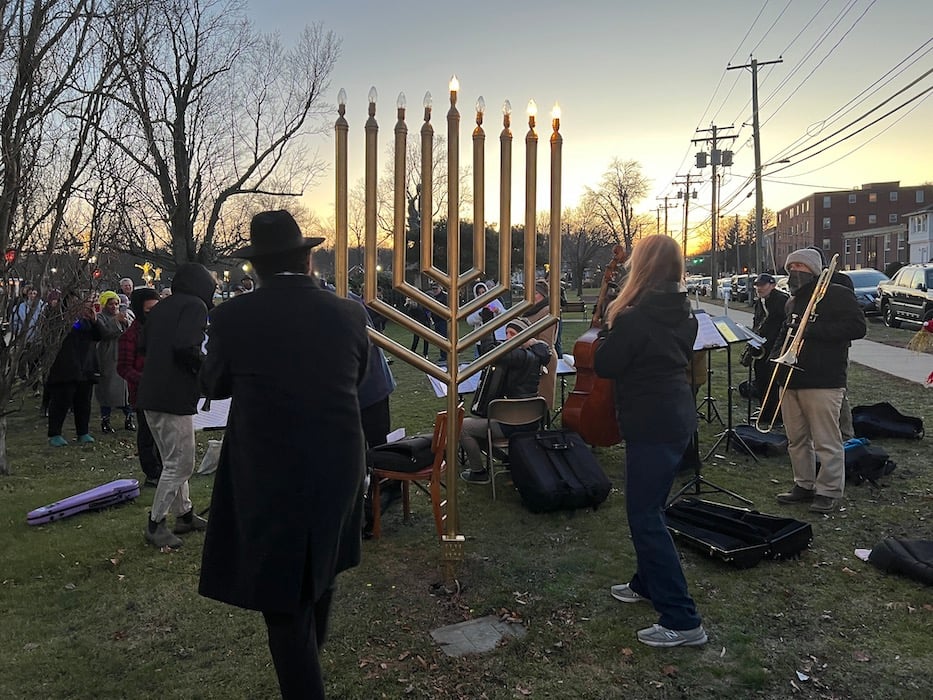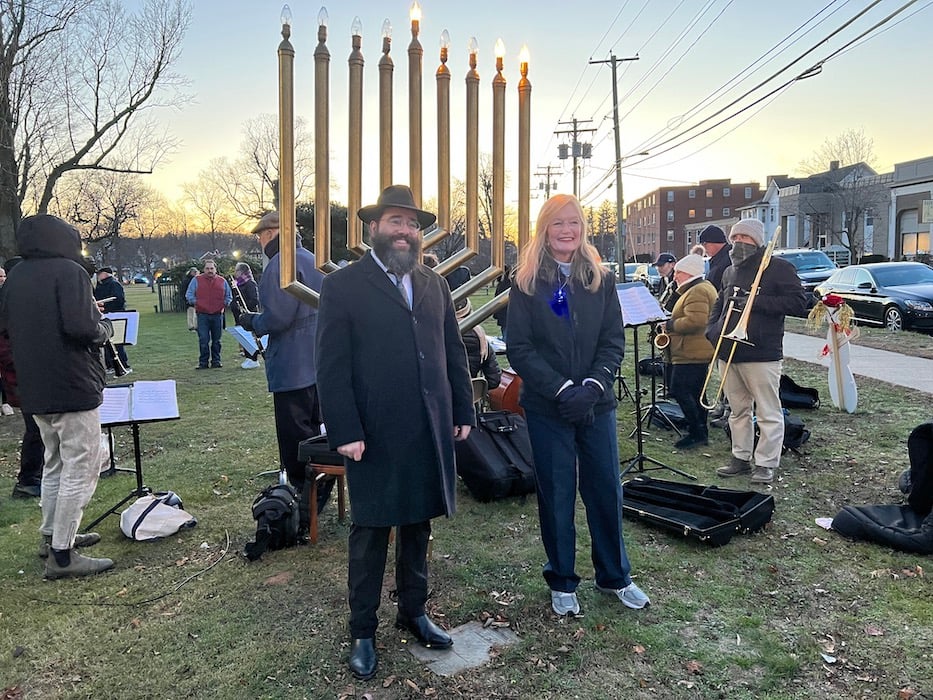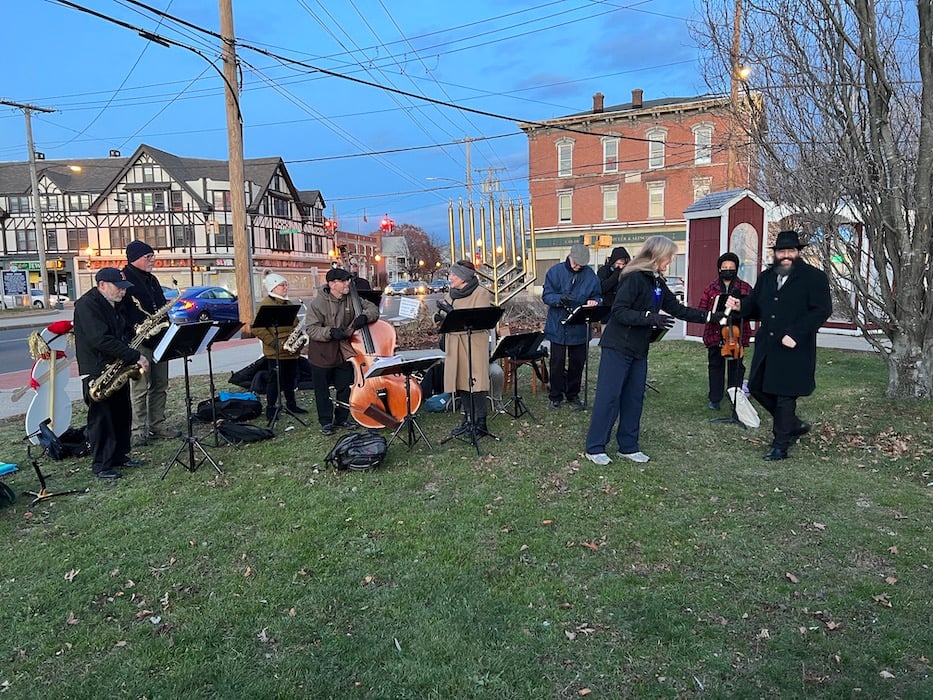
Asher Duke Photos.
Just off Campbell Avenue, the sun was setting and the air was crisp. On a table lay sugar-dusted sufganiyot and hot coffee. Klezmer musicians carried the tune of “O Hanukkah” in Yiddish and English, conjuring centuries of tradition. Nearby, a small crowd formed, ready to receive the gift of light.
With a burst of energy, three bulbs on a larger-than-life menorah came to life, illuminating the faces of those waiting around it.
Monday night marked the now-annual menorah lighting on the historic West Haven Green, just across the street from West Haven City Hall. To welcome in the festival of lights, Rabbi Schneur Wilhelm of Chabad of Milford-Hebrew Congregation of Woodmont and Mayor Nancy R. Rossi of West Haven collaborated to make the celebration possible.
Rossi called the event, which featured music from the Nu Haven Kapelye and received support from ArtsWest CT, a celebration of West Haven’s kaleidoscopic and diverse community. It fell on the second night of Hanukkah, which celebrates the Jews’ triumph over the secular Greek Seleucid Army and miracle of light in the darkest time of year.
Among attendees were several of West Haven's city council members as well as State Rep. Treneé McGee.

“I think it’s important to honor all different walks of life and all different religions,” Rossi said during the lighting. “I think it’s wonderful because we’re a very diverse community, and I think it’s important that we celebrate that diversity.”
“What is it exactly about this holiday that we’re celebrating?” Wilhelm added as the sun began its descent into the sky. “So when we look back at the story of Hanukkah there were miracles, there were two miracles. The miracle of the victory of the Maccabees over the Greeks as well as the victory of the oil. They found enough oil to last for one day, but it lasted for eight days, and that’s why we light the menorah for eight days.”
Wilhelm tied Hanukah’s meaning and origin story to the continued survival of the Jewish people. Together, he and Rossi walked to the menorah, and with the press of a button, turned on the lights. As they welcomed the dark, the traditional Hanukkah blessing—Baruch atah Adonai Eloheinu Melech ha-olam, asher kid'shanu b-mitzvotav, v-tzivanu l'hadlik ner shel Hanukkah—drifted through the air. At 4:30 sharp, members of the Kapelye began to play, weaving a story of Hanukkah through song. As they flowed through their set, the familiar bars of “S’vivon Sov Sov Sov” floated over the Green.

While the gathering was small, Wilhelm rallied attendees around the idea of Jewish resistance and resilience, of survival in the face of continued persecution. Jews for so long had survived enslavement, expulsion, and genocide, he said—and yet they were still there, to honor a millennia -old miracle that has been passed down through ritual, oral tradition, and music.
“The Greeks, they wanted to eradicate the spirituality of Judaism,” he said. “They said, ‘You know what, you can celebrate the Torah, be Jewish, it’s a nice beautiful culture, but not because God necessarily told you to do so.’ Now, the Maccabees said ‘We are Jews and we are proud Jews. We are not intimidated by anybody and anything.’”
And indeed, both music and the blessings over the Hanukkah lights reverberated throughout the crowd. Children in puffy coats held their parents close, repeating the words they had been taught from a young age. They were already doing their part to keep the 2,000-year-old tradition alive.
This sentiment of Jewish continuation was present throughout the night. Against the bitter chill of the air was the warmth emanating from the community. People laughed and spoke to each other. Children ran around, their mouths coated in powder from the jelly doughnuts they had eaten. The tinny-sounding unwrapping of gelt could be heard as attendants opened their faux-gold coins to reveal the stamped milk chocolate inside.
As people gathered, it also became a small, bright show of resilience in a two-year period that has seen a nationwide, and global, rise in antisemitism. In 2021 alone, the Anti-Defamation League (ADL) reported a 42 percent increase of antisemitic incidents in Connecticut. That tracks with a nationwide increase in Antisemitic incidents, as well as anti-Asian, anti-Black and anti-immigrant hate crimes across the country.
As the Nu Haven Kapelye played in a mix of English, Yiddish, and Ladino, the crowd swayed back and forth to the sound of the music, the sense of love and life was the only feeling that remained.
“And so my friends, as we stand here tonight we look around a world, sometimes it seems to be dark,” Wilhelm said before leaving. “But we have to remember that with hope and determination we will prevail.”
This article is part of a new collaboration between the Arts Paper and students at the University of New Haven (UNH). Asher Duke is a junior at UNH.